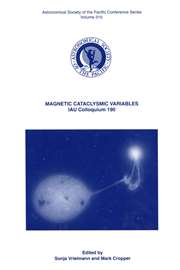No CrossRef data available.
Article contents
Astrophysical consequences of the screening of nuclear reactions
Published online by Cambridge University Press: 12 April 2016
Abstract
The rate of nuclear reactions depends on the influence of the surrounding particles that compose the plasma. At high densities the situation is far from being satisfactory and the influence of electron polarization has not been completely elucidated. In particular, it is shown that the possibility of an accretion induced collapse of a carbon-oxygen white dwarf instead of a supernova explosion completely depends on the screening factors and pycnonuclear rates that are adopted. Similarly, the possibility of detecting isolated neutron stars that accrete matter from the interstellar medium depends on the adopted pycnonuclear rates. Low rates allow the formation of a metastable layer that can release energy explosively and produce aγ-ray burst. Nevertheless, current rates seem to prevent such a situation.
- Type
- Reviews
- Information
- International Astronomical Union Colloquium , Volume 147: The Equation of State in Astrophysics , 1994 , pp. 106 - 125
- Copyright
- Copyright © Cambridge University Press 1994


